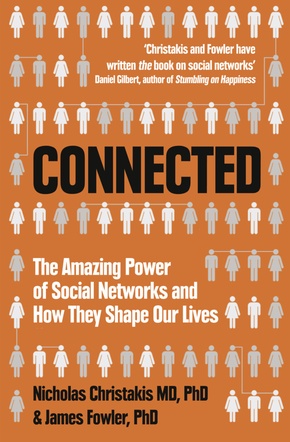
Connected - The Amazing Power of Social Networks and How They Shape Our Lives
| Verlag | HarperCollins UK |
| Auflage | 2011 |
| Seiten | 352 |
| Format | 12,9 x 19,8 x 2,2 cm |
| Gewicht | 260 g |
| Artikeltyp | Englisches Buch |
| ISBN-10 | 0007303602 |
| EAN | 9780007303601 |
| Bestell-Nr | 00730360EA |
Is happiness catching? Are your friends making you fat? Can your sibling make you smart? Is wealth contagious? Where is true love found? Does free will exist?
Is happiness catching? Are your friends making you fat? Can your sibling make you smart? Is wealth contagious? Where is true love found? Does free will exist?
Based on exciting discoveries in mathematics, genetics, psychology and sociology, 'Connected' is an innovative and fascinating exploration of how social networks operate. Think it's all about who you know? It is. But not the way you think.
Turns out your colleague's husband's sister can make you fat, even if you don't know her. And a happy friend is more relevant to your happiness than a bigger income.
Our connections - our friends, their friends, and even their friends' friends - have an astonishing power to influence everything from what we eat to who we sleep with. And we, in turn, influence others. Our actions can change the behaviours, the beliefs, and even the basic health of people we've never met.
In this brilliantly original and effortlessly eng aging exploration of how much we truly influence one another. Pre-eminent social scientists Nicholas Christakis and James Fowler explain why obesity is contagious, why the rich get richer, even how we find and choose our partners. Intriguing and entertaining, with revelatory implications for everything from our notion of the individual to ideas about public health initiatives, 'Connected' will change the way you think about every aspect of your life, and how you live it.
Rezension:
'In the category...of works of brilliant originality that stimulate and enlighten and can sometimes even change the way we understand the world' New York Times Review of Books
'An illuminating account of the pervasive and often bizarre qualities of social networks...We like to think we are largely in control of our day-to-day lives, yet most of what we do, and even the way we feel, is significantly influenced by those around us - and those around them, and those around them....The authors excel at drawing out the devil in the detail: their explanations of how the architecture of networks dictates their dynamics are compelling....profound' Michael Bond, New Scientist
